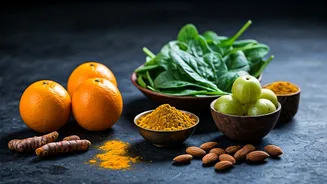Turmeric: The Golden Healer
Turmeric, a spice deeply rooted in Indian culture, is renowned for its vibrant color and exceptional health benefits. Its active compound, curcumin, is a potent
antioxidant and anti-inflammatory agent. Consuming turmeric, whether in curries, warm milk (haldi doodh), or supplements, helps reduce inflammation throughout the body. This reduction benefits the skin by calming irritation and promoting a clearer complexion. Furthermore, turmeric supports liver function, which is critical for detoxification. A healthy liver naturally contributes to radiant skin by efficiently removing toxins that can otherwise cause dullness or breakouts. To maximize its impact, combine turmeric with black pepper; the piperine in black pepper enhances curcumin absorption significantly. Consider incorporating turmeric into your daily meals, such as adding it to vegetable stir-fries, using it in soups, or sipping on a turmeric latte for enhanced winter well-being and a noticeable glow.
Amla: Vitamin C Powerhouse
Amla, also known as Indian gooseberry, is a small, tart fruit packed with Vitamin C, a crucial nutrient for skin health. Vitamin C is a powerful antioxidant that combats free radicals, preventing premature aging and protecting skin from environmental damage. Amla stimulates collagen production, resulting in firmer, more elastic skin and reducing the appearance of fine lines and wrinkles. Consuming amla can boost your immune system, making you less susceptible to seasonal illnesses. This also helps maintain healthy skin, as a strong immune system reduces the likelihood of skin issues. Incorporating amla into your diet is easy; you can eat it raw, in juice form, or as a dried powder mixed into smoothies or sprinkled over salads. Amla also aids in iron absorption, promoting better overall health and contributing to a natural glow. The abundance of Vitamin C in amla makes it an ideal superfood for maintaining youthful and vibrant skin, especially during the challenging winter months.
Ghee: The Nourishing Elixir
Ghee, or clarified butter, is a staple in Indian cuisine and a significant contributor to healthy skin. Ghee is rich in essential fatty acids that hydrate and nourish the skin from within. It helps maintain the skin's natural moisture barrier, crucial during winter when skin tends to become dry and flaky. Ghee also contains antioxidants that protect against environmental damage and support overall skin health. Besides its nutritional benefits, ghee is often applied topically. Its emollient properties make it an excellent moisturizer, soothing dry and irritated skin. Applying a thin layer of ghee to the face or other dry areas can provide instant relief and promote a healthy glow. Including ghee in your diet, such as using it in cooking or adding a spoonful to warm milk, helps improve skin elasticity and reduces inflammation, contributing to a vibrant, healthy complexion during winter. The rich content of fat-soluble vitamins, like vitamins A and E, further enhances its skin-rejuvenating capabilities, making ghee a vital addition to your winter skincare routine.
Spinach: The Green Booster
Spinach, a leafy green vegetable, is an excellent source of vitamins, minerals, and antioxidants, all essential for healthy skin. It is particularly rich in vitamins A, C, and K, which play crucial roles in skin health. Vitamin A promotes cell turnover and reduces inflammation, while vitamin C, as mentioned, aids in collagen production and antioxidant protection. Vitamin K helps reduce dark circles and promotes overall skin radiance. Spinach also contains iron, contributing to healthy blood circulation, which helps deliver oxygen and nutrients to the skin, giving it a healthy glow. Including spinach in your diet can protect against premature aging and maintain skin elasticity. You can easily incorporate spinach into your diet by adding it to salads, cooking it in curries, or blending it into smoothies. The high water content in spinach also helps hydrate the skin from the inside out, making it an excellent choice for maintaining healthy and vibrant skin throughout the winter season.
Ginger: Inflammation Fighter
Ginger, with its spicy kick, is not only a flavourful addition to meals but also a powerful superfood for skin health. It is known for its potent anti-inflammatory and antioxidant properties. Ginger helps fight free radicals that can damage skin cells and cause premature aging, resulting in a more youthful appearance. Regular consumption of ginger may help reduce inflammation, which can calm skin irritations, redness, and breakouts. Additionally, ginger can improve blood circulation, ensuring that essential nutrients reach the skin cells efficiently. This also contributes to a natural, healthy glow. Incorporating ginger into your diet is simple: you can add fresh ginger to your teas, curries, or stir-fries. Ginger can also be consumed in juice form. Its warming properties make it especially beneficial during the winter, while its skin-enhancing benefits make it a must-have superfood for a radiant, healthy complexion. By including ginger in your daily routine, you can help protect your skin from winter dryness and maintain its vitality.












